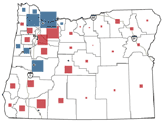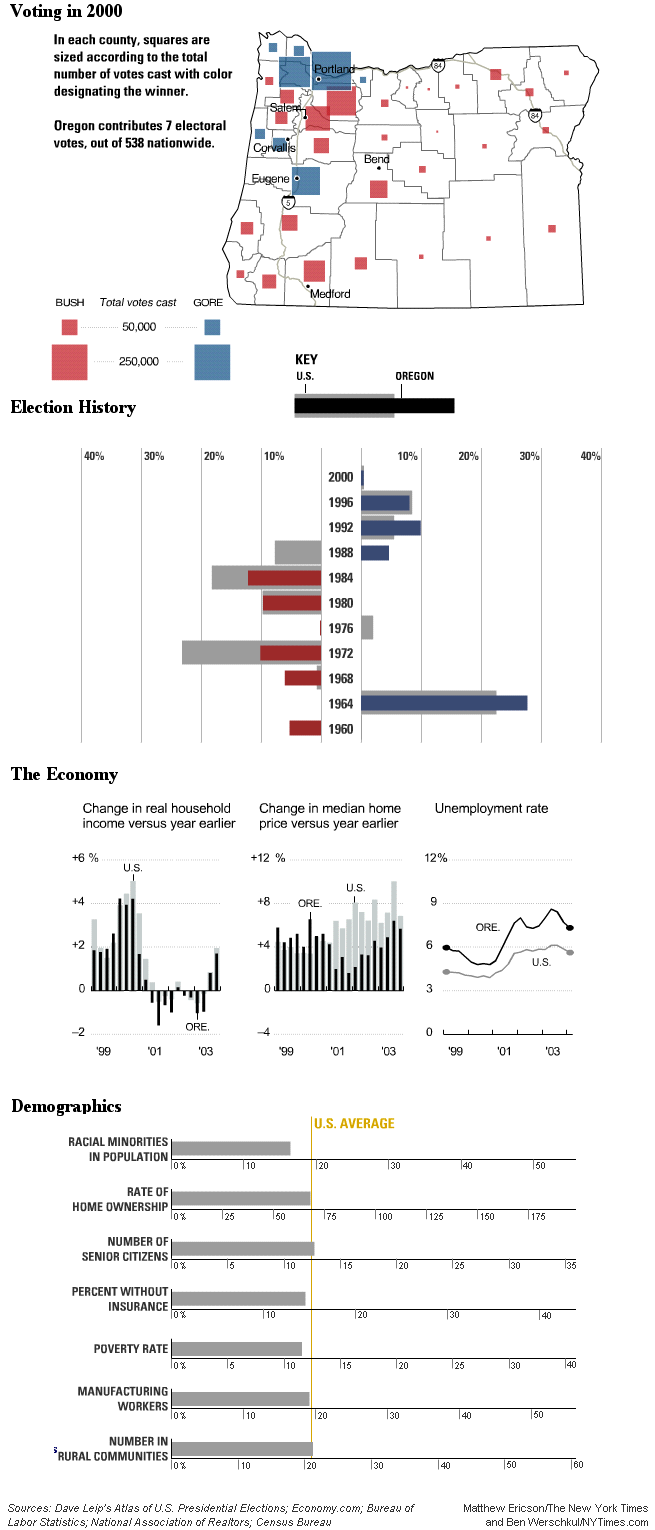
Published: August 27, 2004
Article originally published at http://www.nytimes.com/2004/08/27/politics/campaign/27state.html

 REGON CITY, Ore., - Jerry Witham's presidential votes over the last 20 years might seem rather erratic.
REGON CITY, Ore., - Jerry Witham's presidential votes over the last 20 years might seem rather erratic.
He voted for Ronald Reagan once, Bill Clinton twice and President Bush in 2000. Now Mr. Witham, 40, a cook at Howell's Restaurant and Lounge here in northwest Oregon and one of this state's many independent voters, has decided to switch back to the Democrats and vote for Senator John Kerry.
"I don't feel like I like being trapped into being a Republican or a Democrat,'' Mr. Witham said in an interview at the restaurant recently. "I feel like being an independent gives me more choices." He said he voted for George W. Bush in 2000 because "I believe he deserved a chance."
But, he added: "I don't think he did the best job that he could. I don't believe he was honest with us with the whole thing going on in Iraq. And I think he had his own economy above the American people's."
Mr. Witham's voting record is not unusual in Oregon, a battleground state with 1.9 million voters that Al Gore won by less than one percentage point in 2000. Ralph Nader made one of his strongest showings in Oregon, with 5 percent of the vote.
Besides being an independent, Mr. Witham is what pollsters call a "switchable," and there are a lot of them in Oregon, where one in five voters, or 400,000 people, are registered independents. Tens of thousands of others are registered with alternative parties like the Libertarians and the Pacific Greens, and many registered Democrats and Republicans have no qualms about decamping to the other side.
At a time when the national electorate is polarized, the votes of the switchables and independents are coveted in a swing state like Oregon. "We think so differently in Oregon than people do in the rest of the country," said Alice Norris, the mayor of Oregon City, a former mill town 20 miles southeast of Portland, at the nexus of the Clackamas and Willamette Rivers. "We fancy ourselves to be incredibly independent."
Ms. Norris was a Republican until several years ago, when she switched to the Democrats.
Oregon, with its seven electoral votes, is considered a "top tier" swing state because of how close the 2000 election was. And while the populous Portland area is liberal, outlying rural and suburban counties amid forests or farms, including this one, Clackamas, are either divided or far more conservative.
But the most recent polls show Senator John Kerry pulling ahead of Mr. Bush in Oregon, breaking a dead heat that was in effect for much of the spring and early summer. In a July 23 poll of 600 likely voters by the American Research Group, Mr. Kerry, who drew an estimated 50,000 people to a riverfront park in Portland on Aug. 13, the day Mr. Bush was host of a private meeting with about 2,000 business people in nearby Beaverton, was leading Mr. Bush, 50 percent to 42 percent. The same group released a poll in May showing a tie at 45 percent.
Mr. Kerry has visited Oregon three times since the campaign began; Mr. Bush has visited twice.
[To date, Mr. Kerry has raised more money than Mr. Bush in Oregon, $1.5 million, compared with Mr. Bush's $1.3 million, according to PoliticalMoneyLine, which tracks campaign financing.]
"As voters in Oregon are looking at the Bush presidency, I think by and large you've got a slight majority who find it wanting," said Tim Hibbitts, who conducts polls for The Oregonian, the big newspaper. "Bush has a very large base here, but it's not a winning base at all." But Mr. Hibbitts added, "I do not believe that by any stretch it's over in Oregon or that Bush can't win here."
While many voters say the economy is their top concern - Oregon has had the nation's highest unemployment rate for many of the last 18 months - Mr. Hibbitts and other voters said it was the war in Iraq that was now hurting Mr. Bush here.
The American Research Group poll showed that Mr. Bush had lost support among Republicans from May 5 to July 23, with 80 percent supporting him in the latest poll, down from 90 percent.
But Mr. Bush maintains a loyal core here. Morrie Jubb, 51, an unemployed accountant who lives in Aurora, not far from Oregon City, is a registered Republican who has voted for Jimmy Carter and Ross Perot. And he said that although he was tempted by Mr. Nader's candidacy, he would probably vote for President Bush.
"Things have to be taken care of, and you can't do it in four years and then start with a new person again," Mr. Jubb said. "Maybe he's the lesser of two evils, but at least he knows his way around the White House."
Mr. Jubb and several other Bush supporters said they did not blame the president for the nation's or Oregon's economic woes.
"He's done a good job with the economy," said Art Harding, 55, an engineer who lives here in Oregon City and is a Republican. "With what happened with the high-tech industry and the stock market, it was something that was going to happen."
Still, Democrats, including the governor, Ted Kulongoski, are betting that Oregon's economic troubles will motivate voters unhappy with President Bush and give Mr. Kerry a more comfortable margin of victory than they gave Mr. Gore in 2000, when Oregon's economy, heavily tied to the high-tech boom, was flying high.
Recent bad news on the national jobs front does not bode well for Oregon, which is already far behind other states, with an unemployment rate in July of 6.8 percent, well above the national rate of 5.5 percent. (That is a decrease from July 2003, when the Oregon unemployment rate was a whopping 8.7 percent.)
"It's still the economy," Mr. Kulongoski said in a telephone interview. "It's the whole issue of jobs."
Oregon, which has the nation's only all-mail-in balloting system, often eludes political pigeonholing because of its voters' tradition of fierce independence. Oregonians abhor big government and taxes. They have rejected a state sales tax nine times over the last 40 years, and this year they voted down a temporary income tax intended to solve the state's budget crisis.
Oregon is the only state that allows doctor-assisted suicide, and Republicans and Democrats alike have vigorously defended the law in the face of repeated challenges from conservatives, including Attorney General John Ashcroft, who recently lost an effort to have it struck down by a federal appeals court.
Gay marriage will be a critical election issue here. The state's well-organized social conservatives succeeded recently in placing on the November ballot a proposed amendment to the state's Constitution that would define marriage as between a man and a woman. But pollsters and several Republican voters said even conservative voters in Oregon, with one of the nation's largest gay populations, mostly in Portland, are likely to be squeamish about allowing the government a say in such personal decisions.
"I don't care," Mr. Harding, the Republican engineer, said. "I would vote to allow it, contrary to my Republican history. I believe individuals have a choice."
It is easy to see why this county, which along with Washington County, also near Portland, is one of two important swing counties in the state, drew early and intense interest from Democrats and Republicans.
Clackamas, a collection of suburbs, exurbs and rural towns whose economy is tied to the production of metals, machinery and computer hardware and software, as well as to retail, is virtually evenly split between Democrats and Republicans. Mr. Bush won this county in 2000 by only about 1,100 votes of about 162,000 cast.
Independents make up a significant bloc in this county; 23 percent of voters are not affiliated with either party, while 37.3 percent are registered Democrats and 39 percent Republicans. In 2000, 8,000 voters cast ballots for Mr. Nader or other alternative candidates, and the campaigns are aggressively going after those voters.
The campaign here began in earnest here months earlier than it did in 2000, with each party claiming unprecedented interest among volunteers. Democrats attribute the show of support for Mr. Kerry to a belief that the votes cast for Mr. Nader had cost Mr. Gore the election.
But Mr. Nader failed in April in his initial effort to gather the signatures required for a place on the ballot. [On Tuesday, the deadline for his second try, organizers for Mr. Nader submitted more than 18,000 signatures, well above the 15,306 need. But a legal challenge is threatened by a union that supports Mr. Kerry, the Service Employees International Union.] Despite Mr. Bush's dip in the polls, many of his supporters here are holding fast.
Andy Spicer, 21, a college student, said he would be voting for the first time in November, for Mr. Bush. He has plenty of friends and relatives who disagree with his choice, but he said he disliked Mr. Kerry.
"I would rather not vote for someone whose whole campaign is, 'I'm not this person - I'm not George Bush,' " he said on a recent afternoon. "Tell me who you are."
Joe Pankownin, a construction worker who lives in Beaver Creek in Clackamas County, said he did not vote in 2000 because he did not much care for either presidential candidate or about the outcome.
That has all changed now, as both the war and the economy have piqued his interest, Mr. Pankownin, a registered independent, said. He added that he would vote for Mr. Kerry.
"I've never seen our economy worse in my 28 years of life," he said. "I don't really even follow politics, but I know one thing. I'm worse off now than I was four years ago."

